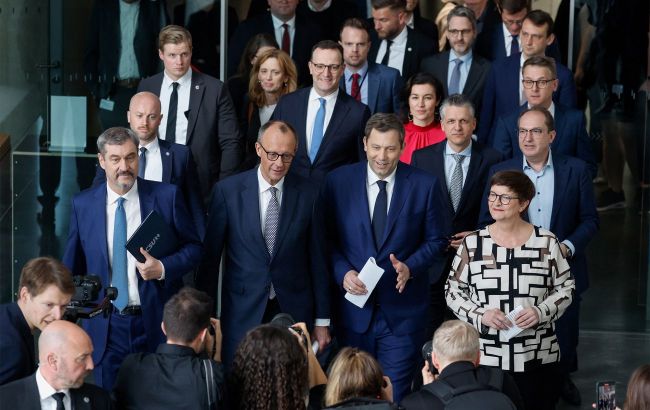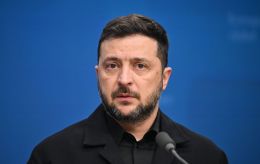Merz’s team: Key figures in Germany’s new government and what it means for Ukraine
 Photo: CDU leader Friedrich Merz and the coalition (Getty Images)
Photo: CDU leader Friedrich Merz and the coalition (Getty Images)
The key positions in the future German government will be held by politicians who are generally favorable to Kyiv.
RBC-Ukraine explains who will lead the key ministries and their views on Ukraine.
Friedrich Merz - Chancellor
The new leader of the German government has vast political experience. He was for many years the main rival of Angela Merkel in the Christian Democratic Union (CDU) and has been leading the party since 2021.
Merz has stepped away from politics several times to work as a corporate lawyer and served on the supervisory boards of numerous companies. Notably, he chaired the supervisory board of the German branch of investment giant BlackRock.
Overall, the new chancellor is a representative of the center-right political camp. In his election promises, Merz stated that he would make Germany function again. He advocates for simplifying the tax system and lowering taxes. Merz also supports implementing a stricter immigration policy. Moreover, he calls for an increase in defense spending and the creation of a National Security Council to develop a new National Security Strategy.
Merz has consistently supported Ukraine since the start of Russia’s full-scale invasion. While in opposition, he criticized Olaf Scholz's government for insufficient support for Ukraine.
Among other things, he was a proponent of providing Ukraine with Taurus missiles. He has visited Ukraine several times. During his last visit in December 2024, he assured that, if elected chancellor, he would increase military support for Kyiv.
Lars Klingbeil – Minister of Finance
The position of Minister of Finance in Germany's political hierarchy is the second most important. Additionally, the Finance Minister has direct influence over the allocation of aid to Ukraine. He will also serve as Deputy to Merz in the role of Vice Chancellor.
Lars Klingbeil has been co-leader of the Social Democratic Party (SPD) since 2021. He belongs to the conservative-pragmatic wing of the party. Historically, the Social Democrats have supported closer ties between Germany and Russia. However, after Russia’s full-scale invasion, Klingbeil acknowledged that this was a mistake and called for a complete reevaluation of the approach towards Russia. In March 2023, he visited Ukraine.
At the same time, Klingbeil supports diplomatic negotiations alongside providing military aid to Ukraine. In January 2023, the politician stated that he was following the approach of German Chancellor Willy Brandt (1969-1974): on one hand, supporting military strength, on the other, focusing on diplomacy.
Johann Wadephul – Minister of Foreign Affairs
A member of the Bundestag since 2009, Johann Wadephul previously served as Deputy Leader of the CDU/CSU parliamentary group. He specializes in foreign policy and defense matters. Wadephul has frequently criticized the overly cautious nature of German politics and has called for more boldness in confronting authoritarian regimes.
The politician advocates for a tougher German policy towards Russia and emphasizes the importance of maintaining strong ties with the United States. Furthermore, Wadephul stresses the significance of a strong European Union, which must present a unified front in foreign policy.
As the new head of Germany's Foreign Ministry, Wadephul supports providing Ukraine with weapons without restrictions.
On March 10, in an interview with Rheinische Post, Wadephul stated that everything must be done to prevent Ukraine's defeat, which includes supplying the best weapons systems like Taurus. He also supports allowing German weapons to strike deeper into Russian territory.
Boris Pistorius – Minister of Defense
A member of the Social Democratic Party, Boris Pistorius previously served as Minister of Defense in the prior government. He is currently the most popular politician in Germany, and his ratings surpass the ratings of the former Chancellor Olaf Scholz and future Chancellor Friedrich Merz.
Pistorius advocates for increasing Germany's defense budget, as well as that of other EU countries, in light of the threat posed by Russia. He has also called for reform of Germany's "debt brake" – the constitutional limit on the country's budget deficit. Pistorius believes this policy no longer reflects modern realities and hinders defense funding. He has proposed excluding military expenses from these restrictions to allow greater flexibility in budgeting. At the same time, Pistorius rejects US President Donald Trump's demand for 5% GDP defense spending, describing it as unrealistic.
Pistorius has repeatedly stated that supporting Ukraine is costly, but its defeat would be far more expensive. Therefore, he advocates for continued military assistance. However, he takes a cautious stance on the provision of long-range Taurus missiles, emphasizing that decisions regarding their transfer must be carefully weighed. He also rejects any idea of pressuring Ukraine into compromises with Russia and considers discussions about sending European troops to Ukraine premature.
Sources: Frankfurter Rundschau, but it should be noted that other German media outlets are talking about the same key candidates.
Coalition in Germany
In February 2025, early parliamentary elections were held in Germany due to a political crisis in Chancellor Olaf Scholz's government.
As a result of the elections, the conservative bloc of the Christian Democratic Union (CDU) and the Christian Social Union (CSU) received the largest share of the vote.
After the elections, the CDU/CSU and the Social Democratic Party (SPD) began negotiations to form a new coalition, and today, on April 9, an agreement was officially announced.
Read more about this in the material by RBC-Ukraine.

